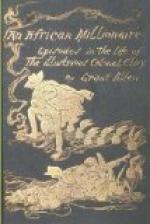“You fool,” Charles answered, in his most unamiable manner (he applies that word to me with increasing frequency); “is that what you’ve waked me up for? Why, the Quackenbosses left Lake George on Tuesday morning, and I had the dispatch-box in my own hands on Wednesday.”
“We have only their word for it,” I cried. “Perhaps they stopped on—and walked off with it afterwards!”
“We will inquire to-morrow,” Charles answered. “But I confess I don’t think it was worth waking me up for. I could stake my life on that little woman’s integrity.”
We did inquire next morning—with this curious result: it turned out that, though the Quackenbosses had left the Lakeside Hotel on Tuesday, it was only for the neighbouring Washington House, which they quitted on Wednesday morning, taking the same train for Saratoga which Charles and I had intended to go by. Mrs. Quackenboss carried a small brown paper parcel in her hands—in which, under the circumstances, we had little difficulty in recognising Charles’s dispatch-box, loosely enveloped.
Then I knew how it was done. The chambermaid, loitering about the room for a tip, was—Mrs. Quackenboss! It needed but an apron to transform her pretty travelling-dress into a chambermaid’s costume; and in any of those huge American hotels one chambermaid more or less would pass in the crowd without fear of challenge.
“We will follow them on to Saratoga,” Charles cried. “Pay the bill at once, Seymour.”
“Certainly,” I answered. “Will you give me some money?”
Charles clapped his hand to his pockets. “All, all in the dispatch-box,” he murmured.
That tied us up another day, till we could get some ready cash from our agents in New York; for the manager, already most suspicious at the change of name and the accusation of theft, peremptorily refused to accept Charles’s cheque, or anything else, as he phrased it, except “hard money.” So we lingered on perforce at Lake George in ignoble inaction.
“Of course,” I observed to my brother-in-law that evening, “Elihu Quackenboss was Colonel Clay.”
“I suppose so,” Charles murmured resignedly. “Everybody I meet seems to be Colonel Clay nowadays—except when I believe they are, in which case they turn out to be harmless nobodies. But who would have thought it was he after I pulled his hair out? Or after he persisted in his trick, even when I suspected him—which, he told us at Seldon, was against his first principles?”
A light dawned upon me again. But, warned by previous ebullitions, I expressed myself this time with becoming timidity. “Charles,” I suggested, “may we not here again have been the slaves of a preconception? We thought Forbes-Gaskell was Colonel Clay—for no better reason than because he wore a wig. We thought Elihu Quackenboss wasn’t Colonel Clay—for no better reason than because he didn’t wear one. But how do we know he ever wears wigs? Isn’t it possible, after all, that those hints he gave us about make-up, when he was Medhurst the detective, were framed on purpose, so as to mislead and deceive us? And isn’t it possible what he said of his methods at the Seamew’s island that day was similarly designed in order to hoodwink us?”




